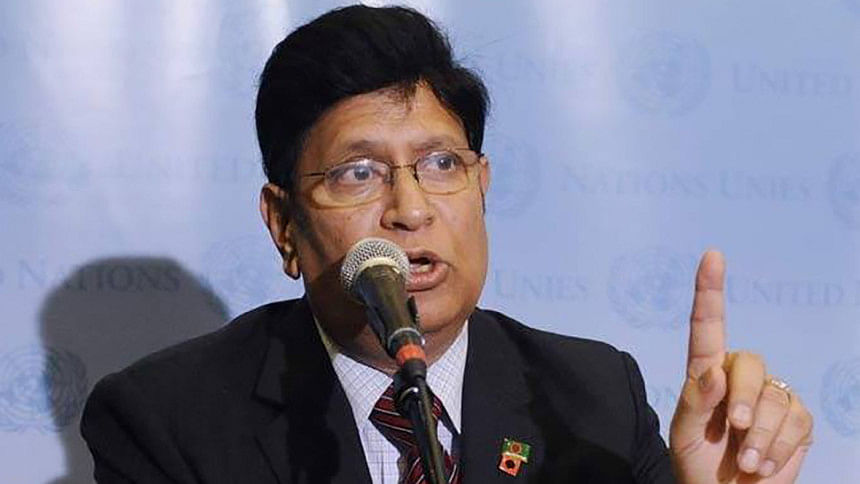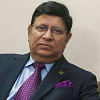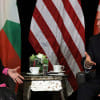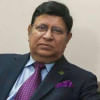Bangladesh not to take blame for any casualty in Rohingya camps: FM

Foreign Minister Dr AK Abdul Momen on Thursday said those who are opposing the relocation of Rohingyas to Bhasan Char Island should take the responsibility if there is any casualty in Cox's Bazar camps during monsoon.
"If people die due to landslides following heavy rainfalls, we'll not be responsible. You - who are creating barriers - should be responsible. This is your responsibility," he conveyed to visiting three top UN officials during his meeting with them.
Heads of three UN agencies -- Filippo Grandi, United Nations High Commissioner for Refugees, Antonio Vitorino, Director General of International Organization for Migration (IOM) and Mark Lowcock, Head of United Nations Office for the Coordination of Humanitarian Affairs (OCHA) and Emergency Relief Coordinator -- jointly met the Foreign Minister at his ministry before leaving for Cox's Bazar.
After the meeting, the Foreign Minister shared with reporters what he discussed with the UN officials at his office mentioning that the weather forecast suggests huge rainfalls during the upcoming monsoon.
Bangladesh is currently hosting over 1.1 million Rohingya people in Cox's Bazar district and most of them arrived here since August 25, 2017.
Bangladesh said the relocation of Rohingya people to Bhasan Char Island will help address the congestion problem in Cox's Bazar Rohingya camps.
Bangladesh also informed the visiting three top UN officials that the government of Bangladesh has already developed Bhasan Char Island to accommodate some 1,00,000 Rohingyas.
The Foreign Minister also encouraged the UN officials to visit Myanmar and work in Rakhine state as Rohingya problem lies in Myanmar.
He said Bangladesh is doing everything that is necessary for the Rohingyas. "I told them very strongly."
The Foreign Minister said Myanmar created the problem and they can solve the problem. He, however, reiterated that Bangladesh wants to see a peaceful solution to the Rohingya crisis.
On March 25, the UN appreciated Bangladesh's efforts to seek alternative locations for Rohingyas but sought clarification about the modalities of potential relocation of Rohingya people to Bhasan Char.
The government of Bangladesh says it plans to relocate Rohingya people from Cox's Bazar to Bhasan Char which could help "decongest" the overcrowded settlements in Cox's Bazar.
"We're seeking clarification about the modalities of any relocation, the living conditions that would be provided and the basic rights and services that refugees would be able to access if they decide to relocate to Bhasan Char," said the UN in Bangladesh in a press statement.
Responding to a question, the Foreign Minister said there are many children are there in the camps but they should learn their own language and Myanmar history as they will have to return their place of origin.
Talking to reporters, Lowcock said it is extremely important that the international community sustains its support for Bangladesh in looking after the people.
It is also extremely important for the UN that the work continues to find the solution to the crisis that is originated from Myanmar, Lowcock said noting Bangladesh's "tremendous and exceptional generosity shown towards Rohingya people.
"UN will continue to do everything it can to promote solutions inside Myanmar," he said adding that they had very "constructive and fruitful" discussion with the government of Bangladesh.
Antonio Vitorino laid emphasis on easing the sufferings and pain of the Rohingya population but also at the same time to minimise the impact on the Bangladesh community.
Grandi said the UN is engaged in Myanmar to work with the government of Myanmar to try and find a solution for the Rohingya community.
"We're making assessments," he said adding that complicated problems, including the citizenship issue of Rohingya crisis, need to be addressed to create a climate of confidence which will allow people to take voluntary decision to go back.
Responding to a question, he said he hopes to visit Myanmar soon so that they can continue the discussion on the other side of the border.
If he goes to Myanmar, he indicates, it is crucial that he visits Northern Rakhine. "We'll continue to engage with the Myanmar government.
On Wednesday, the UN officials met Prime Minister Sheikh Hasina and State Minister for Foreign Affairs Shahriar Alam.
They are now in Cox's Bazar and will visit Rohingya camps on and Friday.
Earlier, Shahriar expressed dissatisfaction at the failure of Myanmar to build confidence among the Rohingyas to return to their homeland.
He urged the visiting UN agency heads to put in further efforts to create conducive environment in Northern Rakhine and also enhance the engagement with Myanmar in building schools, hospitals, mosques and other basic structures for the Rohingyas in their place of return.
The State Minister also reiterated the proposal of creating a safe zone in Myanmar proposed by Prime Minister Sheikh Hasina in the UN General Assembly and requested the visiting dignitaries to pursue with Myanmar for creating the safe zone.
At the end of the meeting, the State Minister assured of extending Bangladesh's full support to the humanitarian actors working for the Rohingyas and urged the UN agencies to take effective steps to solve the crisis.

 For all latest news, follow The Daily Star's Google News channel.
For all latest news, follow The Daily Star's Google News channel. 







Comments